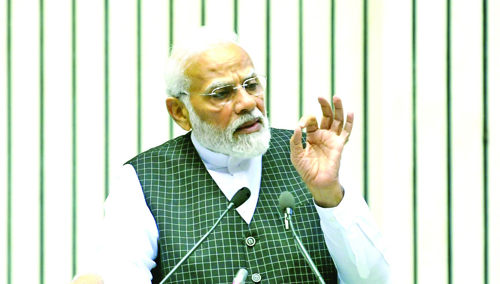

STATE TIMES NEWS
New Delhi: Prime Minister Narendra Modi on Friday pitched for a “proactive rather than reactive” approach and the use of future technologies in handling natural disasters to minimize damage.
Inaugurating the third session of the National Platform for Disaster Risk Reduction (NPDRR) here, the prime minister said, “We cannot stop natural disasters but we can come up with systems to minimize damage from them.”
“We have to be proactive rather than reactive. What was the situation in the country (earlier) for being proactive and what is the situation now? Even after five decades of Independence, there was no law in the country to tackle disasters,” he said.
After the 2001 earthquake in Kutch, Gujarat was the first state to come up with a disaster management act, he said. On the basis of this act, the Centre enacted the National Disaster Management Act in 2005, he said.
Subsequently the National Disaster Management Authority was set up.
He pointed out that it was natural for previous governments to place disaster relief with the agricultural department.
He recalled that when natural calamities like earthquakes struck earlier, it was dealt at the local level with the help of local resources.
The prime minister highlighted that the world over it is a norm to learn from each other’s strengths.
He stressed the need to develop a dynamic system to deal with natural calamities.
Modi said that by studying natural calamities of the past century, an accurate assumption can be made, and also stressed on revising these methods in due time, be it material or system.
He said in India the system, solutions and strategy of disaster management have always been local.
Citing the example of the “bhunga” houses of Kutch which survived the earthquake to a large extent, the prime minister stressed the need to evolve local models of housing and town planning as per new technologies.
“Enriching local technology and material with the new technology is the need of the hour. When we link the examples of local resilience with future technology, only then we will be able to do better in the direction of disaster resilience,” he said.
He said traditional housing and town planning process should be enriched with future technology to better manage disaster planning, and added real-time assessment of resilience of local infrastructure was the need of the hour.
“Tradition and technology are our inherent strength. We can use it to build model for disaster resilience not only for India but for entire world,” he said.
The prime minister said there is a need to develop models of housing or town planning at the local level.
“Knowledge on aspects such as age of houses, drainage, resilience of our electricity and water infrastructure will help in taking proactive steps,” he said.
He emphasised the need to strengthen disaster management governance in the local bodies.
“We will have to institutionalise planning and review local planning,” he added.
The prime minister also pitched for encouraging the participation of locals in disaster management.
“You will get success only by following the mantra of ‘local resilience by local participation’,” he said and appealed to stakeholders to train youth and women — “Yuvak Mandals” and “Sakhi Mandals” — at village and neighbourhood levels.
The prime minister cited his discussion on hospital fires during his recent review meeting on the heatwave and how regular review of fire preparedness at hospital can save lives.
He highlighted the increase in fire incidents in dense urban areas such as a hospital, factory, hotel or multi-storey residential building in the past few years, especially with the increasing heat.
Modi said challenges of having to work very systematically in densely populated areas where reaching by a vehicle is a difficult task and insisted on finding a solution for this.
He called for constantly increasing the skill-set of firefighters in order to extinguish the fire in high-rise buildings while also making sure that there are enough resources to extinguish industrial fires.
He said recognition and reforms are necessary to strengthen disaster management.
Recognition refers to understanding the probability of a disaster and areas where it can strike in future and reforms means system to reduce the chances of disaster, he said.
Speaking on the occasion, Home Minister Shah said the time has come to enhance skill and speed in matters related to disaster management.
“We not only could reduce the deaths but also helped other nations in tackling natural calamities. Recently we had sent NDRF (National Disaster Response Force) to Turkiye and their extraordinary work was praised the world over,” he said.
The home minister said that before 1999, there was no proper system of disaster management.
“What we did at that time was only providing relief and to some extent rehabilitation but in the last nine years we have extensively set up early warning systems which helped us in handling natural calamities successfully,” he said.
In the past few years, India has witnessed a paradigm shift in disaster management with its “think-ahead approach”, Shah said.
During the programme, the prime minister felicitated awardees of the Subhash Chandra Bose Aapda Prabandhan Puraskar for 2023 — Odisha State Disaster Management Authority (OSDMA) and the Lunglei Fire Station, Mizoram.

